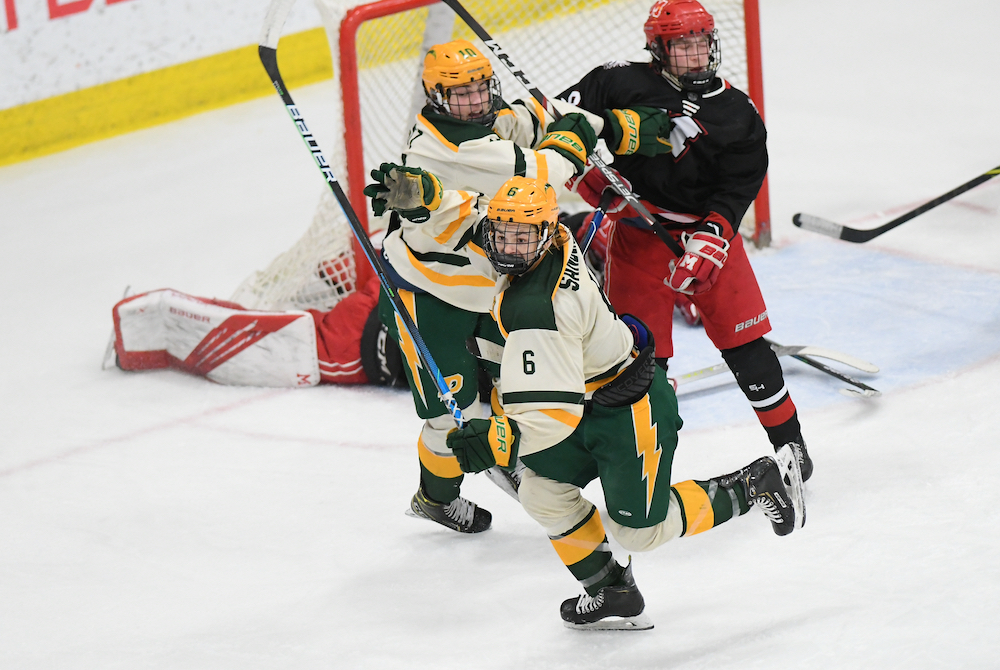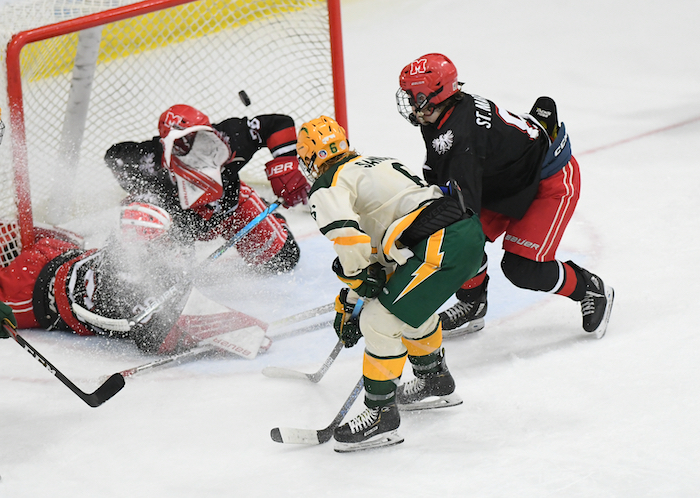
Officials Eager for New Hockey Format
July 12, 2019
By Rob Kaminski
MHSAA benchmarks editor
Tuesday, Feb. 26, was a particularly busy day on the ice as the 2019 MHSAA Ice Hockey Tournament reached just its second day around the state.
On the slate that night were 27 Regional games, bringing the two-day total to 48 on the heels of Monday’s busy calendar.
As teams were busy setting their sights on the ultimate goal, so, too, was another group of accomplished skaters who toil with much less fanfare. Nonetheless, the games can’t start without them – the folks in the striped shirts who call the games.
Just as players and coaches will welcome the expanded playoff format in 2020, the officials are looking forward to the change as well.
“When we got to the first week of the tournament, it seemed like we were going every day,” said Jim Gagleard, who assigns officials for the Livonia Ice Hockey Officials Association. “There are only so many officials to go around in any sport. By allowing us as officials a day or two to catch our breath, it’s good. Good for us, and good for players more than anything.”
If it seemed like every day, well, it was. A total of 66 games were played over the first three days, and 89 over the first four. Considering each game at the Regional level has three officials, that computes to 267 officials needed during that span. On the busiest day, 81 had to take to the ice.
Given that there were a total of 302 playoff-eligible officials in 2019, filling those slots can be a logistical nightmare for assigners at times.
“Regional week will see a huge burden alleviated for officials and especially assigners. There will be so much more flexibility under the new format,” said Dan DiCristofaro, President of the Northeast Hockey Referees Association. “Last year, we were faced with so many doubleheaders at single sites, and the first games needed an early start so that the second games would not last late into the evening on school nights.
“At times, the most important factor for the assigner was scheduling those officials who could get to the arena for the early start times. Merit and ability sometimes had to take a back seat.”
Gagleard agrees, saying, “Assigning-wise, early games are the toughest to fill. Everyone has a job, and in order to work a game they have to tell the boss they’re leaving at 2:30 for a 5 o’clock game. You start to look for officials who are retired, or can get out of work, instead of the most qualified. That’s not fair to the teams playing.”
In the northern reaches of the Upper Peninsula, the problem is more acute.
Sean Jacques is the athletic director at Calumet, and also an experienced official, having skated the Division 2 Final in Plymouth in 2016.
“Not enough,” Jacques said, in reference to the number of playoff officials in the UP. “Not enough. When I get the list of eligible officials that is sent to tournament managers, I have to search and scramble to find three people within an 80-mile radius.”
Moving the Quarterfinals to the weekend will definitely help matters, and eliminating Regional doubleheaders should ease the scheduling anxiety as well.
 “With Regionals spread out more, without doubleheaders, officials potentially could work more days,” Jacques said. “And there should be more availability for the Quarterfinals. The last few years, it was in the Sault, and getting four guys to the Sault on a weeknight, whether from Escanaba or northern lower Michigan, was difficult. There were times I’d turn down a Quarterfinal because I just couldn’t get there and back and make it to work the next day. Saturday makes it easier.”
“With Regionals spread out more, without doubleheaders, officials potentially could work more days,” Jacques said. “And there should be more availability for the Quarterfinals. The last few years, it was in the Sault, and getting four guys to the Sault on a weeknight, whether from Escanaba or northern lower Michigan, was difficult. There were times I’d turn down a Quarterfinal because I just couldn’t get there and back and make it to work the next day. Saturday makes it easier.”
On the west side of the Lower Peninsula, assigner Randy Sheahan uses a mathematical approach to illustrate his challenges, even for the regular season. Sheahan calculates that 98.88 percent of all West Michigan games are scheduled for Wednesday, Friday, or Saturday. Breaking it down further, 84.39 percent skip Wednesday and schedule only Friday or Saturday.
With the shortened regular season coming in 2019-20 to allow for a three-week tournament window, Sheahan took a proactive approach.
“When the MHSAA announced the change to a three-week tournament, I emailed all West Michigan coaches, plus a handful of athletic directors and booster leaders who may be involved in team scheduling,” Sheahan said. “I encouraged them if they are having difficulty squeezing all their games into a window which is now one week shorter, to give further consideration to playing on Mondays, Tuesdays, or Thursdays to greatly alleviate some of the stresses we place on the West Michigan officiating staff.”
As for the MHSAA Tournament, Sheahan agrees with his brethren across the state in metro Detroit that the expansion will benefit assigners, officials, and teams.
“I only see positives,” Sheahan said. “This gives me tremendous flexibility with our staff to maneuver around their professional and personal schedules to keep our best officials on the ice every round, which is an expectation teams have for playoffs. It also provides (at times) much needed rest for officials and teams, especially if they are involved in overtime affairs. This could help with the quality of overall game play.”
That’s the goal for everyone. Fresher legs for players and officials alike will provide a better experience for all involved.
“This allows for physical recovery for everyone on the ice,” said DiCristofaro. “It also allows for better time management for student-athletes, officials and coaches. Even at the Quarterfinal offerings with four officials for each game, we’d run into issues as far as which people could get to places, or wanted to travel and skate late on a work night. Saturday give us much more flexibility and should create more interest in the state tournament.”
The Quarterfinals, Semifinals and Finals have employed a four-official system in recent years, affording an extra position each game for deserving officials while adding to the quality of the game for participants at the highest level.
Sheahan plans to utilize the new format to continue to reward those among his troops who have earned their stripes for such contests.
“In theory, I may have opportunities to increase game counts for some of our perennial playoff officials, but I have no plans to do that,” Sheahan said. “We have other officials every season who are good enough to skate playoffs and have earned it, but simply couldn’t quite break the playoff bubble. Now the opportunity presents itself to reward some of those officials. It would be counterproductive to officiating development if fewer officials are getting opportunities for important games.”
Similarly, DiCristofaro is hoping the time will come when four officials will be assigned to skate Regional Finals, and perhaps the new length of the postseason will open the door.
“Some of most important games are the Regional Finals. Maybe this new schedule can help,” DiCristofaro said. “Four officials offer teams the best possible ice coverage, and they deserve that.”

Unbeatable Goalie, Unrelenting Effort Earn Dow Memorable 1st Title
March 12, 2022
PLYMOUTH — When Collin Lemanski plays the way he did on the biggest of stages, his hockey coach is well within his rights to promote him to the fullest.
While identifying his players in a postgame press conference, Midland Dow coach Dick Blasy introduced the player seated to his left in full goaltending equipment as “best goalie in the state, Collin Lemanski.”
Care to elaborate?
“You can’t do this without goaltending,” Blasy said after Dow won its first MHSAA hockey championship with a 2-0 victory over Orchard Lake St. Mary’s in the Division 3 Final on Saturday at USA Hockey Arena.
“How many shots did they have today? 32? How many goals did they get? I think that speaks for itself. Orchard Lake St. Mary’s brought it. I don’t think it takes a rocket hockey fan to know they took it to us more than we took it to them.”
It was the seventh shutout of the season for Lemanski, who finished with an 18-3-3 record, a 1.29 goals against average and a .950 save percentage.
“I think it’s less about the shutout and more about the team just winning it, our first win,” Lemanski said. “It was great.”
Lemanski said he didn’t treat the championship game any differently than another game, going through his usual pregame routine.
One of the staples of his pregame ritual is this: “Just don’t talk to me,” he said.
 With Lemanski putting up an impenetrable barrier in front of the Dow net, the Chargers hung around throughout the game until they got the break they needed.
With Lemanski putting up an impenetrable barrier in front of the Dow net, the Chargers hung around throughout the game until they got the break they needed.
Caden Chritz, who was robbed earlier in the period, broke to the net and took a shot that was stopped by Eaglets goalie Aidan Klingbeil. Nolan Sanders pounced on the rebound to score with 2:29 left in the third period.
“We knew we were gonna get our chances,” Sanders said. “They had their chances. My line took it into the zone, put it on net, got it in front and just tapped it home.”
With so little time on the clock, the Chargers couldn’t get caught up in thinking they had just won the championship.
“We’ve got to keep our composure, got to stay simple until the final buzzer,” Sanders said. “Just let things roll out.”
Dow couldn’t breathe easily until Ryan Pomranky banked a pool shot from his own end off the left boards and into an empty net with 17.7 seconds remaining.
Dow is the first of Midland’s two hockey teams to win an MHSAA championship. Midland High was a runner-up in 1994, 2008 and 2010. Dow reached the Semifinals three times without getting to the championship game, including in 2020 when MHSAA tournaments were shut down because of COVID-19 restrictions.
“It just doesn’t seem real, to be honest with you,” Blasy said. “I checked the scoreboard about 50 times; it’s still there. It’s still 2-0. It’s unbelievable, but it’s always about the boys. That’s all I really truly care about is the fact that they did this. Whether we won or we lost, it doesn’t really change things. I would’ve been just as proud of these boys if we would’ve come out on the other end, because they just worked so hard.”
Orchard Lake St. Mary’s reached the championship game by running a gauntlet that included defeating 2021 Division 3 champion Bloomfield Hills Cranbrook Kingswood in the Regional Final and second-ranked Warren De La Salle Collegiate in overtime in Friday’s Semifinal.
The Eaglets were playing in Division 3 for the first time since winning that division in 2005. They reached three Division 1 Finals, winning two, before choosing to make the switch.
“We made the decision to change, just because we felt that Division 3 was probably the strongest route,” St. Mary’s coach Brian Klanow said. “Certainly, we’re not a team that runs away or hides from competition; we encourage it. It just makes us better for this time of year. Division 3 this year, we think it’s the deepest division.”
PHOTOS (Top) Midland Dow’s Nolan Sanders celebrates after sending a rebound into the net for what would be the game-winning goal of the Division 3 Final. (Middle) Sanders’ chip in made it just over an outstretched goalie’s glove. (Click for more from HighSchoolSportsScene.com.)

